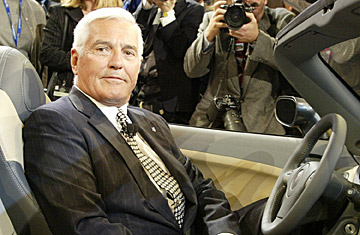
Former vice chairman of the Chrysler Corporation, Bob Lutz
(3 of 11)
ROBERT A. LUTZ: I think you have to—
I think you have to go back and say, "Well, these—"
GERALDINE LAYBOURNE: But television completes the global market.
ROBERT A. LUTZ: It does today, but television grew and prospered in the United Kingdom when it was still just the BBC and before ITV was invented, and that's why I think you have to go back in the case of television — I don't want to belabor the point, but I would argue rather than for national content — I'd go back to Mr. Sarnoff.
Walt Disney, I agree because that is a brand that has gone around the world.
GERALDINE LAYBOURNE: Well, he also invented—
NORMAN PEARLSTINE: The fact that you put it—
You really raise a very interesting question that maybe is worth spending a little of our time on in, and that is how much, if you look at the century as a century of business, how much it's peculiarly an American century and how much it's an international century.
When we did our first gather like this on leaders and revolutionaries clearly that was global. That was international, and Mao or Hitler or Churchill was every bit as relevant as either Roosevelt.
With artists and entertainers, I was the only one on the panel who thought that Picasso shouldn't be the artist and entertainer of the century.
But I think when it comes to business it is very much an American story, not only in television, but really across industries and that that's one of the things we have to acknowledge about the 20th century that is different. And I think that's— it's peculiarly true in entertainment, but I would say it's also true in automotive, in computing, and in a large number of other industries that we'd be looking at.
WALTER ISAACSON: Especially in entertainment. If it's been one thing America has dominated, it seems, is the export of television and movies and entertain—
Ray, you're not a big Disney fan, are you?
RAY BRADY: Not particularly because he was known for paying his artists very, very poorly.
WALTER ISAACSON: Well, that should eliminate [crosstalk]
RAY BRADY: But I'm not an artist, but anyway it just seems to me that Europe was very slow to get going after the war, and I can't imagine that there was sensational TV over there at the time — or even movies, except for the Italian movie industry, which I think is great.
And even today you've got the French yelling about the input of American films and television. The Canadians now are mad again.
And it just shows our dominance, I think.
WALTER ISAACSON: Darla, will you—
DARLA MOORE: Talking about entertainment, it's interesting we're talking about entertainment as such a large segment of the 20th century — entertainment.
When you think about that, why is that? And why is it uniquely American? That's because we got so much money. We are so wealthy as a people that we can afford these extraordinary levels of entertainment that we— that we engage in.
And I look at Disney and, albeit a genius, certain a creative genius, I see him as developing a product that simply went through a distribution channel that was already in existence.
WALTER ISAACSON: You mean, "movies"?
DARLA MOORE: That was funded—
The movies.
That it was funded and capitalized and already there, and he had a creative product idea, as I say a very, very smart and certainly creative, but it was just another product, another idea.
GERALDINE LAYBOURNE: But that was only one segment of his business.
DARLA MOORE: One segment, but it's the one he's known for.
GERALDINE LAYBOURNE: And he was the—
He was the originator of that wonderful idea — synergy.
I mean, he really figured out how you use television as an advertising medium. He figured out how to put his theme park on television and get paid for it.
WALTER ISAACSON: Well, one thing Disney was — as you said — is an image-maker, somebody who figured out how to use television in order to get a message across. And that's one outgrowth of this television and the new image industry.
Some of it happened here. I was wondering if any of you had opinions of the great image-makers, the great advertisers — the Leo Burnetts or Ogilvys or whatever it may be. You— that's your field.
GERALDINE LAYBOURNE: Well, I do have an opinion.
WALTER ISAACSON: Good.
GERALDINE LAYBOURNE: Shocking as that may be.
I think David Ogilvy was really a big innovator in that, even though he came to advertising late in his life, when he was— not until he was 38 years old and he'd been a farmer and a lot of other things that were seemingly irrelevant, but he really figured out about brands and personalities in brands and promises that you have to make to consumers.
It was a very substantial advertising. It was not sort of let's-find-a-quick-glib-way-to-advertise-product. It was the essential tools that you need to research consumers, to figure out what motivates them, where they are, and he was really a student of product and consumer.
